created the original format of our programmes over 30 years ago, in addition to establishing a unique methodology for delivering them – EduDrama®. Today, our curriculum development team comprises experienced educators and early childhood specialists who work closely with our teaching teams. Together, they ensure each lesson is relevant, engaging and current, and succeeds in delivering the benefits of an EduDrama education to every child. This curriculum development process involves input and feedback from students, parents, the Ministry of Education and Trinity College London assessors.


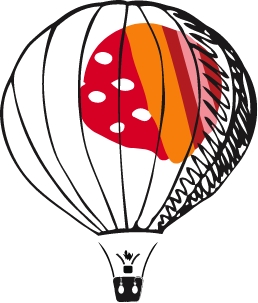


Mark works closely with Trinity College London to ensure our programmes are aligned to their assessments and co-ordinates our speech and drama teacher training courses. He is the Tournament Director of the Singapore Secondary Schools Debating Championships and designs programmes so children can master the art of debate and persuasive speaking. Mark has been working at Julia Gabriel Education since 1999 as a teacher, trainer and member of the Board of Directors.
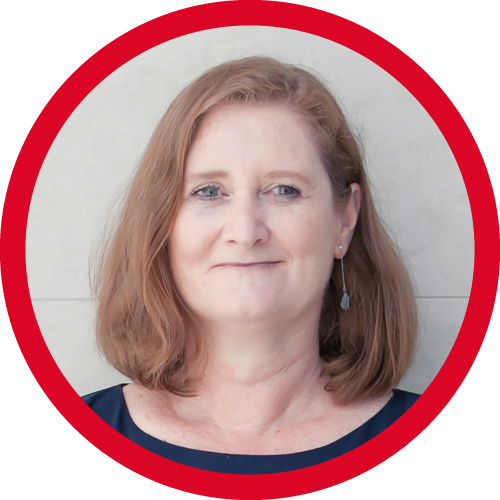
Since 2000, Fiona has been designing programmes to support children with learning differences. She has worked extensively with children, families and teachers in our schools in Singapore and overseas. She supports teachers so they can adapt curriculum appropriately to suit the needs of individual learners.

Reuben has been at Julia Gabriel Education since 2015. He is involved in creating curriculum for the Stage Lights Performance Arts programmes. He has also developed mindfulness programmes which give children the tools needed to develop emotional literacy and focus. Reuben also plans and conducts training for drama educators.


Elisa is the Head of the Early Learning Programmes and works closely with parents and their young children to create learning experiences that enable our youngest students to develop in all domains. Elisa has been working for Julia Gabriel Education since 2003. She ensures the quality of the programmes for our youngest students in Julia Gabriel Centres in Singapore and overseas.

Claire has worked for Julia Gabriel Education since 2002, both in Singapore and Jakarta. Claire works on all the performance elements in our Early Learning Programmes. Claire also creates training for teachers to use drama in the classroom to engage the children.
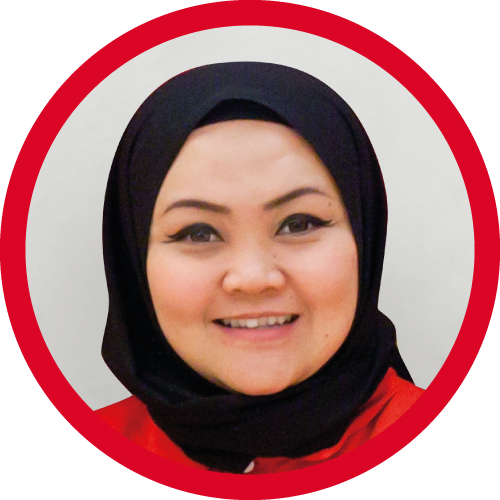
Zai has always worked with young children and was with a preschool and a children’s gym before joining Julia Gabriel Education in 2014. Zai works with our youngest students and ensures that a high standard of care and quality is met in all experiences planned for our PlayNest babies.
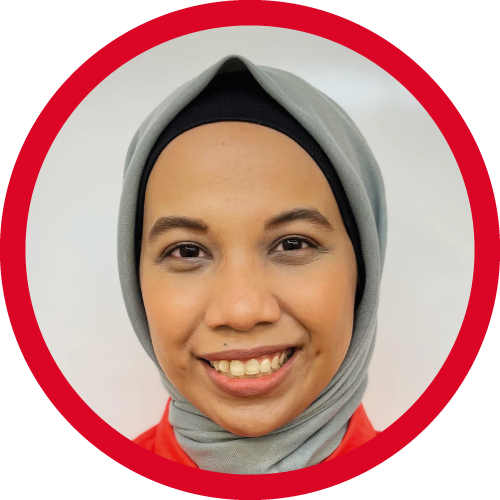
Julizan joined Julia Gabriel Education in 2009 as a part-time assistant teacher. She soon discovered her passion for working with children and trained to become a teacher. Her creative approach to engaging children is perfect for designing lesson plans for PlayClub classes.
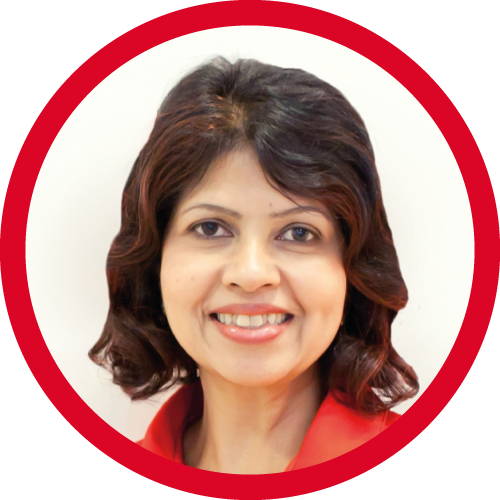
Mala worked closely with our founder, Julia Gabriel, when she joined us as a speech and drama teacher in 2002. Her role includes ensuring that all elements of EduDrama are delivered throughout our programmes, in addition to overseeing programme quality in all Drama, Communication and Literacy classes. Mala continues Julia’s vision through teacher training and programme design. Before joining Julia Gabriel Education, Mala was a teacher at Nanyang Girls’ High School.

Moe Moe has been involved in teaching and designing literacy programmes for many years, working with preschool, primary, secondary and university students. She has worked in established enrichment centres, schools and university programmes. Moe Moe first joined Julia Gabriel Education in 2004 and has been deeply involved in the creation of our Readers and Writers programmes.
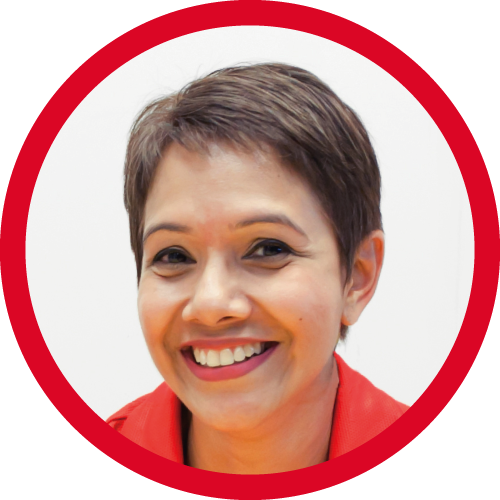
Teaching was a second career for Shyam, although she was involved in speech and drama as a student. Today Shyam co-ordinates and designs our communication-based programmes that are taught in our centres and in primary and secondary schools throughout Singapore. This involvement with the Ministry of Education keeps Shyam and our teams up to date with any new direction in these schools. Shyam also prepares the curriculum to support all our Speech Communication Arts students for assessments with Trinity College London. Shyam has been with Julia Gabriel Education since 2011.
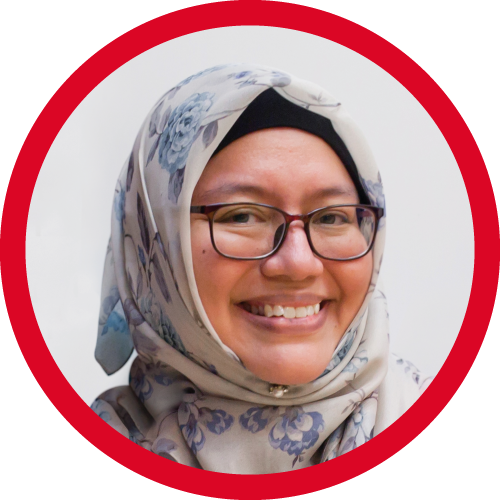
Fidi has been acting since she was 8 years old and has performed both on stage and on screen around the world. Her love of drama and children come together in her role as an educator. Fidi is passionate about creating programmes which engage and motivate children to express themselves with clarity and confidence. Fidi joined Julia Gabriel Education in 2003.
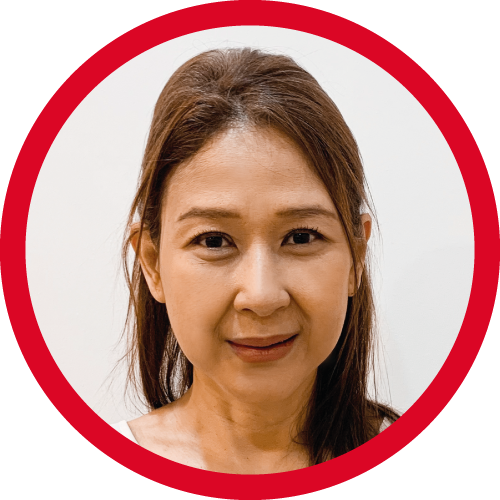
Since 2004, Tina spent much of her time at Julia Gabriel Education as a kindergarten teacher in our Julia Gabriel Preschool (originally under the name Chiltern House).


At Julia Gabriel Preschool, we build a foundation that sparks a difference for life.
At Julia Gabriel Preschool,
we build a foundation that
sparks a difference for life.
Group Managing
Director
Principal
Head of Centre, Julia Gabriel Preschool Thomson
Head of Centre, Julia Gabriel Preschool Mountbatten
Head of Centre, Julia Gabriel Preschool Keppel Bay
Head of Mandarin, Julia Gabriel Preschool
Head of Training and Programme Quality (Preschool)
Senior Curriculum Specialist

Julia Gabriel Education Pte Ltd © 2024. All rights reserved.
With a wide range of programmes available, we are home to a large number of educational specialists and developmental experts. We are happy to share our experience and support you in your parenting journey.
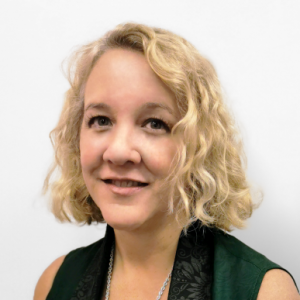
Group Managing Director, Julia Gabriel Education
Qualifications:
Master of Education and Bachelor of Education (Honours) degrees in Early Childhood Education from the University of South Australia.
Diploma in Montessori Teaching from the Maria Montessori Training Organisation.
Background Information:
My family comes from Scotland, however I was born in Singapore and spent my childhood living in the United States, Canada and South Africa before my family returned to Singapore, allowing me to finish high school here. After completing a Montessori teaching diploma in London, I came back to Singapore and joined Julia Gabriel Centre as a teacher of the PlayClub and Written Language Arts programmes in 1991. I quickly found that the philosophy which underlies all of Julia Gabriel Education’s programmes strongly mirrors my own belief in the importance of respecting and nurturing each individual through positive interactions and collaborative experiences.
I left Singapore in 1994 to help establish a nursery school in Scotland. I enjoyed this experience, but I missed the warmth and passion which was integral to the environment at Julia Gabriel Centre. So I came back to Singapore two years later and re-joined the centre. I then moved to Julia Gabriel Preschool and became the Head of Centre at Julia Gabriel Preschool Forum (then named Chiltern House Preschool.). I subsequently became the Principal of both Julia Gabriel Centre and Julia Gabriel Preschool in Singapore before becoming the Managing Director of the Julia Gabriel Education group. I also work closely with other professionals to help establish best practices in childcare in our community in Singapore.
I thoroughly enjoy working with all our staff to ensure we provide the best possible education for our children and their families, and I feel very lucky to have the opportunity to work with so many wonderful children, parents, teachers and support staff.
Personal Interests:
I have two children and my favourite thing to do is spend time with my family and friends. Whether I’m walking my dogs, preparing meals, travelling, doing yoga, watching movies or just chatting and catching up, I’m happiest when I’m surrounded by those who are dear to me. I also love reading and my Kindle is usually within an arm’s reach. I believe we never stop developing and learning, and that we should constantly try new things, eat new food and visit new places. That must be why I love planning meals and holidays when I’m not at work!

Principal
Qualifications:
Master of Arts degree in Early Childhood Studies from Roehampton University.
Bachelor of Arts degree in Linguistics from Massey University.
Diploma in Education from the National Institute of Education, Nanyang Technological University.
Background Information:
Working with children has always been a passion for me. I began my career as a primary school teacher at CHIJ Bukit Timah, where I taught for four years. I then decided to move into early childhood education and I joined Chiltern House as a Kindergarten 2 teacher from 2001-02.
After my first stint at Chiltern House, I went on to work for other early childhood organisations, teaching for a further three years before moving into management roles. I also wrote a preschool English Language curriculum and two series of assessment books on mental mathematics and English grammar, as well as lecturing part-time in Communication Skills and English Language at Nanyang Polytechnic.
I returned to Chiltern House as a Senior Teacher in 2007, and I was the Head of Centre at Chiltern House Forum from 2008-10. I’m now the Principal of Julia Gabriel Preschool, overseeing the running of all our centres in Singapore.
Personal Interests:
I love listening to music, particularly jazz music, musicals and original soundtracks. I also really enjoy attending concerts, plays and musicals. I love making embroidery beading accessories like earrings, bangles, broaches and necklaces, as well as adding “bling” embellishments to bags, shoes or anything else within my reach using Swarovski crystals, lace, ribbons, etc, to make my things unique and one-of-a-kind. I’m a travel bug and I make sure that I travel to at least one country every year. I love the unexpected and therefore enjoy adventures of any kind during my trips abroad.

Head of Centre, Julia Gabriel Preschool Thomson
Qualifications:
Bachelor of Early Childhood Studies degree from the University of Melbourne.
Diploma in Early Childhood Studies from the Singapore Institute of Management.
Certificate in Preschool Management & Administration from the National Institute of Education, Nanyang Technological University.
Background Information:
I began my teaching career in 1989. I worked in various preschools and childcare centres in Singapore as a teacher and supervisor before joining the teaching team at Chiltern House in 2007. I became a Head of Centre in 2010 (initially at the centre we had in Forum, Orchard Road).
I love working with children and I view education as a two-way process where me and my colleagues and l learn together with the children. I value interaction in the classroom and believe that optimal learning occurs when children are full engaged in activities. I take great pleasure in seeing students enhance their confidence and develop holistically. Children are one of life’s greatest blessings and I celebrate the privilege of being able to provide them with a safe and nurturing environment.
Personal Interests:
I have a passion for dancing which I have been pursuing since I was 5 years old. I’m a trained Indian classical dancer and I enjoy both performing and choreographing. I’ve performed in theatre shows, National Day events and the Chingay Parade.
I also enjoy exploring new places, reading, listening to music and just being positively optimistic about what life has to offer. I believe every day is new day in which something can be learned.
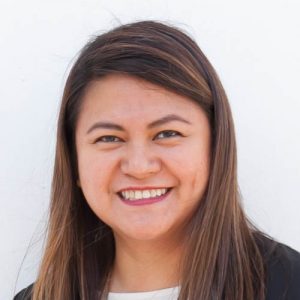
Head of Centre, Julia Gabriel Preschool Mountbatten
Qualifications:
Master of Arts degree in Education from Ateneo de Manila University.
Bachelor of Science degree from the University of Santo Tomas.
Graduate Diploma in Early Childhood Care & Education from Advent Links-SAUC.
Background Information:
When I was young, I wanted to be a paediatrician because, as clichéd as it may sound, I wanted to be instrumental in helping children to grow up healthy. However after finishing a pre-medical course, I decided that I wanted to effect change in children on a more personal level by moulding their minds and hearts to help them become caring, smart and strong individuals. So I became a teacher.
I’ve worked in the field of education since 1996. I started out by teaching computer skills to young children (back when computers weren’t yet a household necessity and everyone was scared that they’d reset back to zero once we reached the year 2000!). I developed a curriculum for preschool-aged children so that the skills could be passed on to the youngest members of society. I then started teaching in a preschool in the Philippines and, after a few years, become the Head Teacher at an English-Chinese preschool.
I came to Singapore in 2005 and while I was out shopping, I became enchanted with the happy laughter and music coming from a children’s centre in a shopping mall. I instantly knew that I wanted to be the type of teacher who gave children the warm, fuzzy feeling that I witnessed in children coming out of Julia Gabriel Centre. So I applied to join the Julia Gabriel Education group and was delighted to be hired as a teacher at Chiltern House, which is now known as Julia Gabriel Preschool. Two years later, I became a Senior Teacher. I worked at a few different Chiltern House centres in Singapore in a variety of roles before becoming the Head of Centre at Chiltern House East Coast in 2019.
Working in the field of education has been a wonderful blessing for me. I get to work with beautiful and passionate people every day – both adults and young ones – and I’m always learning new things. I’m constantly excited about what tomorrow brings!
Personal Interests:
I’m an avid reader. Stories and characters come alive when I read and I always find it fascinating to see how a plot unfolds. (If a zombie apocalypse happened, I’d wish to be trapped in a library or a bookstore with my family, where I’d happily wait out the days until a miracle serum is discovered!) I also love writing – an interest which has led me to make contributions to magazines and self-publish an e-book.
I enjoy cooking, baking and doing DIY projects at home. I love taking nature-walks, and am a frustrated gardener and a grateful traveller. I’ve included all the places mentioned in ‘Having a Coke with You’ by Frank O’Hara in my ‘bucket list’ of places to visit in this lifetime!
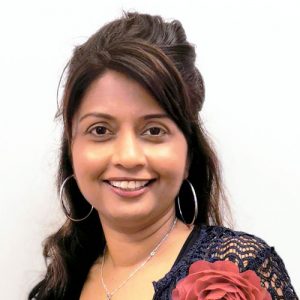
Head of Centre,
Julia Gabriel Preschool Keppel Bay
Qualifications:
Bachelor of Early Childhood Studies degree from Monash University.
Diploma in Early Childhood Studies from the Singapore Institute of Management.
Diploma in Early Childhood Care & Education from Advent Links-SAUC.
Certificate in Preschool Teaching from the National Institute of Education, Nanyang Technological University.
Certificate in Speech & Educational Drama from Kinderland Learning Centre.
Background Information:
I joined Chiltern House now known as Julia Gabriel Preschool as a teacher in 1999, having spent the previous seven years working at various different preschools, international schools and children’s centres in Singapore. During my first few years at Chiltern House, I was also a part-time teacher of the Written Language Arts programme at Julia Gabriel Centre. I’ve taught classes of all four year-groups at Chiltern House and have served periods as the Curriculum Co-ordinator for the Nursery 1, Nursery 2 and Kindergarten 2 year-groups, helping to develop the curriculum for our centres in Singapore and overseas.
After eight years at Chiltern House Forum, I moved to Chiltern House Turf Club Road in 2007 and was the Deputy Head of Centre before becoming the Head of Centre in 2012. I thoroughly enjoy working with the preschoolers at Julia Gabriel Preschool. It is my firm belief that only through a warm, supportive environment can our teachers bring out the very best in every child.
Personal Interests:
I love exercising as it’s my way of keeping myself physically and mentally balanced and relaxed. I have a strong interest in fashion and try to always keep myself up-to-date with the latest trends. I also enjoy cooking, especially experimenting with exotic recipes from the countries I visit.

Head of Mandarin, Julia Gabriel Preschool
Qualifications:
KLC International Institute Diploma in Early Childhood Care and Education-teaching (Chinese)
Diploma Child Development Psychology in Beihua University Teacher’s College
Background Information:
I was born in China and my mother was an Early Childhood Educator, hence I’ve always had an interest and desire to work in this field. I completed my education in China and then moved to Singapore to further my studies. On my graduation from the KLC International Institute, I joined Chiltern House Preschool. I was attracted to this preschool because of their EduDrama® Methodology. In 2018, I was promoted to a Senior Mandarin Teacher and in 2020, I became the Head of the Mandarin Department.
I am passionate about children learning Mandarin in a fun and exciting way. Drama has given me an avenue to build the children’s confidence in using the language. I enjoy working with my team to continue to develop our teaching skills and the quality of the Mandarin programmes.
Personal Interests:
Having lived in Singapore for more than 10 years, I love the culture and variety of food here. I enjoy spending time with my wife engaging in sports such as running and swimming in our spare time.
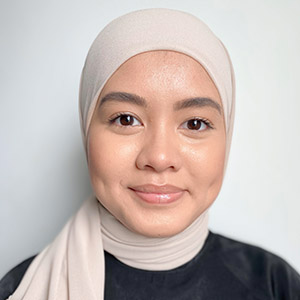
Senior Curriculum Specialist
Qualifications:
Bachelor of Science in Early Childhood Education from Wheelock College Singapore, Singapore Institute of Technology.
Diploma in Early Childhood Care and Education from Ngee Ann Polytechnic.
Higher Nitec ITE Certificate in Early Childhood Education from Institute of Technical Education College Central Bishan.
Background Information:
My journey in the early childhood industry began in 2008 as an assistant teacher in a childcare centre. While pursuing my studies full-time, I worked part-time in childcare and enrichment centres until 2016. This allowed me to apply theory to practice and gain a better understanding of children and their needs.
In 2016, I started working as a teacher at Chiltern House Preschool now known as Julia Gabriel Preschool and later progressed to become an Assistant Curriculum Coordinator. During my teaching career, I had the pleasure of working closely with parents as they often provided valuable insights about their children. I believe a strong home-school partnership is crucial for a child’s holistic learning and happiness.
Currently, I hold the position as the Senior Curriculum Specialist and have developed and conducted various trainings for teachers on early childhood education and curriculum implementation.
My years of teaching have taught me that a child’s education is not just about learning to read and write, but also about cultivating kindness and compassion to make a positive impact on the world.
Personal Interests:
I absolutely love diving into books that give me those “aha!” moments for both my personal life and career ambitions. Reading academic journals also allows me to stay informed of the latest educational trend in the early childhood industry. I also enjoy watching TED Talks to broaden my perspective and to get me inspired.
Baking is my superhero cape against stress—though baking croissants might not be the smartest move. I try to cultivate the habit of going for more leisurely strolls, which always ends with a good meal at a hawker centre.